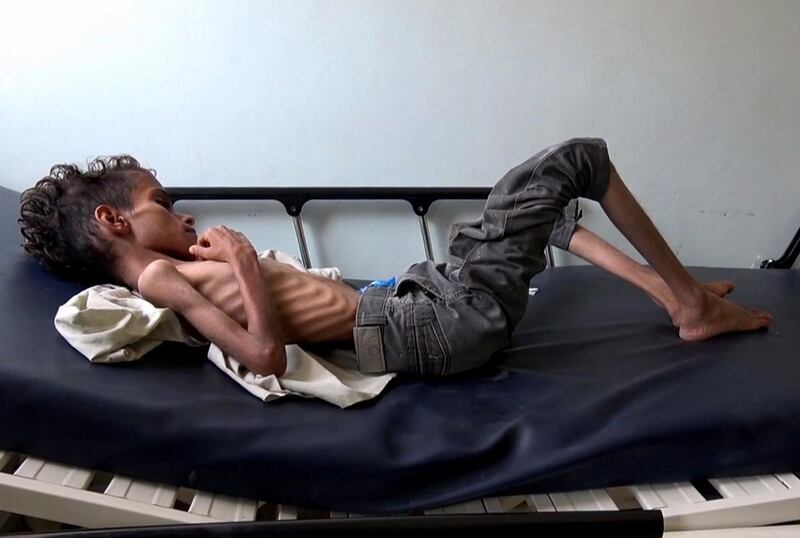Nearly 85,000 children under the age of five have died from acute malnutrition in Yemen since the start of the conflict, an international NGO said on Wednesday, after humanitarian officials warned that the war-torn nation was heading towards the worst famine in history.
The statement by UK-headquartered Save the Children came a day after Saudi Ambassador to Yemen Mohammed bin Saeed Al Jaber met the Head of the International Committee of the Red Cross for the GCC, Yahya Al Oleibi, to discuss co-operation over the humanitarian situation in Yemen, according to the Saudi Press Agency.
Eight million Yemenis are currently affected by severe food shortages, according to UN officials, who warned that up to 14 million – or half of Yemen's population – are at risk of famine.
Of that number, 1.8 million are children under five years old who are described as acutely malnourished. Another 400,000 are severely acutely malnourished, and yet another 1.1 million are malnourished pregnant or nursing women.
“I saw children dying before my very own eyes,” the head of the UN World Food Programme, who visited Yemen last week, said in a televised interview with CNN. David Beasley said he tried to tickle the children expecting them to smile, but it felt instead “like tickling ghosts”.
Aid organisations blame both Houthi rebels and the Saudi-led coalition for deteriorating humanitarian conditions in the country.
Aid groups, including Save the Children, say not enough food is entering the country through Yemen's main port of Hodeidah.
The rebel-held port, through which the country imported up to 90 per cent of its food before the war, has had a drop-off of commercial imports by more than 55,000 tonnes a month since the Saudi-led coalition imposed a blockade on the area a year ago, Save the Children said. This is only enough to meet the needs of 4.4 million people, including 2.2 million children, it said.
Meanwhile, Mr Beasley said Houthi rebels were endangering humanitarian operations elsewhere in the country.
The WFP chief accused the Iran-backed rebels of placing seven landmines inside grain bins in one of WFP’s grain silos in Hodeidah.
He said his team found the landmines only two days after he had left Yemen.
“They [Houthi rebels] have been entering our facilities, violating every humanitarian principle, putting our people, who are working there, putting their lives on the line,” he said. “This has got to stop.”
The deputy governor of Hodeidah province, Waleed Al Qudaimi told The National that the Houthi militia was planting landmines and threatening food warehouses in an attempt to put pressure on relief organisations to providing food for the rebel group's fighters.
He also claimed that rebels stole thousands of sacks of flour meant for families living in rebel-controlled parts of Hodeidah.
Earlier on Tuesday, Saudi Arabia and the United Arab Emirates pledged $500 million (Dh1.8 billion) to tackle food shortages in Yemen.
The new aid programme will provide food assistance to up to 12 million Yemenis.
The UAE and Saudi Arabia are working with organisations on the ground to ensure aid and food assistance reaches the most vulnerable populations, Reem Al Hashimy, UAE Minister of State for International Co-operation, told a news conference.
“We are focusing on the most affected groups, especially malnourished children, pregnant women and the elderly,” she told reporters. “We will ensure that humanitarian conditions improve.”
Yemen is the world’s worst humanitarian crisis, where 8.3 million people are dependent on food aid, according to the UN. The nearly three-year civil war has pushed the country to edge of famine with outbreaks of cholera and diphtheria.
The Saudi-led coalition intervened in Yemen in 2015 to push back the Houthi rebels and restore the government of President Abdrabu Mansur Hadi. The Houthi rebels, backed by the Iranian regime, have repeatedly launched ballistic missile towards Saudi.
_______________
Read more:
Editorial: The moment for peace in Yemen must be seized





